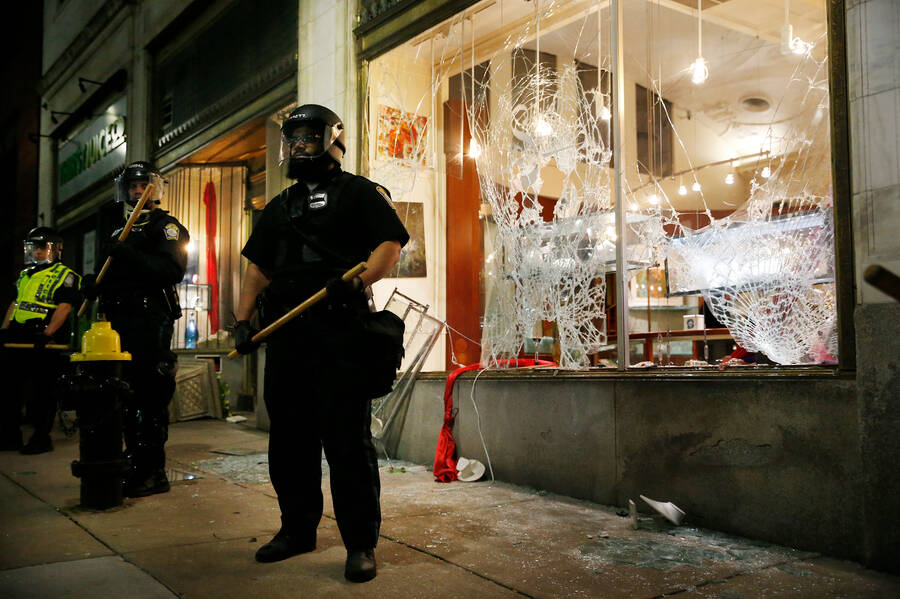By John F. Di Leo, Opinion Contributor
As a new year dawns, we can’t help but look back on recent changes, and wonder what changes are in store for us.
The first thing that came to my mind, a downright surprising realization for me, as I look back on this Christmas season, is the realization that it was the first Christmas ever in which I did not set foot inside a mall.
And I am not alone.
The business pages have followed the ebb and flow of retail for decades. The huge department store has suffered; the small boutique chain has felt it too. The big mall with multiple anchors has suffered; the little strip mall and the stand-alone shop have been devastated.
There have been better years and worse years, of course, and some businesses have done better than others, of course, but on the whole, American retail is suffering, and has been for a generation.
Some insist that it doesn’t matter. ”The market changes, that’s all; it always has and always will.” Or, “So the indoor mall was in vogue for 30 years or so; so what? Now people like to stay home and shop online.”
“They’re still buying what they want, we’re told, so what’s the big deal?” And “it all evens out in the end, right?”
Well, for starters, NO, it doesn’t all even out in the end. Online shopping primarily employs foreign factories and American distribution centers, nobody else. But it’s about much more than that.
Clerking or stocking at a department store is how a huge number of America’s young people get their first jobs, their first taste of working for someone else. (A personal example; I sold men’s dress shirts, ties and shoes at Marshall Field’s, my freshman year in college, as did my father and grandmother… and I worked the very busy giftwrap table at Old Orchard Mall one Christmas season… terrific experience for future jobs, in both customer service and working under pressure!)
Retail can be a longterm career for a head of household, but is usually best as a part-time source of income for homemakers, teachers, college students, anyone in need of a part time job with flexible hours, or someone building a non-traditional career in the arts, a consulting business, or anything else outside the 9-to-5 office world.
Retail provides real estate and sales tax income to the local town and county, and jobs for landscapers, parking lot pavers, security guards, and all the other tangential roles that keep a store or mall presentable and functional.
And most importantly, retail provides a draw for everything else in town. Whether you’re looking at a shopping district or a strip mall or a big mall, the process of shopping – in person, from store to store, either indoors or outdoors, with family or with friends – develops a community and provides a locale in which to concentrate restaurants, bars, comedy clubs and other entertainment venues.
The concentration of retailers creates a destination, drawing people together, compounding the benefits to the community, as each individual store provides potential customers to all the other shops, restaurants, and services in the area.
So, specifically, What is hurting retail today?
The obvious answer is “online shopping.” That’s what the business pages declare, so that’s what we believe. But that’s far from the whole story.
In fact, while lots of people actually enjoy shopping online, lots of others prefer to see the product in person, try it on, confirm that it’s what they want, and take it home with them on the spot. And that requires a real live brick-and-mortar store.
If we had a growth economy – and there’s no good reason why we shouldn’t – we could easily support both worlds – the brick-and-mortar for those who prefer real stores, and the online experience for those who like shopping from home.
So what are our problems? Why was this season one of the worst for the retail sector in a generation; what is keeping people out of the stores?
Crime
There have always been some risks in shopping districts and malls: pickpockets, purse snatchers, shoplifters, etc. This risk goes back centuries; it was always manageable before.
But while these have increased in recent years, there have also been shocking, geometric increases in the style of these crimes. When a political event occurs (such as the Black Lives Matter riots and similar outrages), mobs have chosen stores or shopping districts to storm, with dozens or even hundreds of people, in gang fashion but not necessarily working together, pouring into everything from big box stores to boutiques, ransacking, stealing, and destroying.
The smaller ones, known as “flash mobs” of a dozen or so such thugs, are in and out of a store in a couple of minutes, overwhelming any potential security and destroying the place before police can arrive.
Stores may hire added security, install cameras, pay for brighter lights and more staff, but there is nothing that can protect a store from these mass theft events. Once the word gets out that it happens in a mall, the whole mall dies; the only question is whether that death is slow or quick.
And what does our political class do about it? In county after county across the country, our state’s attorneys have announced that they won’t even prosecute such crimes, basically issuing carte blanche to the criminals to destroy these critical economic nerve centers of their communities.
No matter how hard the retail sector may try, it’s the political sector that’s burying them on this count, letting criminals loose on purpose, inviting gangs into their midst through “sanctuary city” declarations, refusing to prosecute or imprison so many criminals in the first place.
Origin
Fifty years ago, the mall was the place to go, to complete the circle of the American economy. Our iron miners and steelmakers provided the raw materials, our factories manufactured the tools, and we bought them at the local Sears or Montgomery Ward. Our farmers grew the cotton and our chemical plants made the dyes; our textile mills and clothing factories turned it all into clothing, and we bought those clothes at Marshall Field’s or Carson, Pirie, Scott. Our lumberjacks chopped down the trees, our paper mills made them into paper and cardboard, our publishers used them to print books, magazines, calendars and puzzles that we’d buy in the bookstores or game shops at the mall.
Over the years, more and more of these processes were moved abroad; today, it seems, the lion’s share of goods offered for sale are made in China. President Trump valiantly fought the trend, using tax and regulatory policies to try to draw manufacturing back to the United States… but he only had three years; with the usurpation of his office by China’s agents in Washington, the battle to restore American manufacturing has again stumbled.
People once felt patriotic, going to the mall and buying shirts made in New York, puzzles made in Wisconsin, tools made in South Carolina, jeans made in California. That patriotic feeling is gone, when every label seems to say “made in China,” especially with everything we now know about China as an enemy of both the United States and so many of our allies.
Sure, we’ll pay a few dollars more than online at the mall, if we’re buying a US product. But if both were made in China, why not buy the cheaper one online? Americans will support their local store for a good reason; but not if they’re being charged more just to get the same plastic knockoff from Chairman Xi.
Who’s responsible? Here the blame is shared: government tax and regulatory policy has driven manufacturing abroad, but there have also been decades of self-destructive corporate choices by foolish retailers, to source from abroad instead of from their own country, and much too often, the conscious choice to source from enemy nations instead of from friends.
Economics
The greatest challenge, however, because it’s so easily fixed but there is no political will to do so, is the economic challenge. Retail is all about spending money, and for retail to boom, there must be a successful consumer sector, a core base of shoppers who are growing in financial strength and are confident about their future.
The retail market is entirely dependent on the health of their potential consumers.
What do we have today, with double digit inflation and a stagnant manufacturing sector?
Our native-born American population isn’t marrying or having children at the replacement rate, and our political class invites millions of poverty-stricken third-worlders in, through both legal and illegal immigration, to intentionally weaken our economy. This isn’t xenophobia, by the way; it’s not racism speaking. This is math. If the people poring over the southern border were a bunch of poor, sick, uneducated Englishmen instead of Latin Americans, the scenario wouldn’t be any better.
The problem is that we had an economy that was gradually, routinely, moving up its middle class into the upper class, and moving up its lower class members into the middle class. For a century. But the immigration practices of the past half century – along with the intentional explosion of the welfare state – have reversed that trend. Now every time someone climbs up from the tenements and into the suburbs, five more border-jumpers bolster the American underclass and reverse that incremental gain.
This means we have ever fewer wallet-bearing shoppers to give business to the mall, but ever more people with WIC and SNAP cards to shop at the dollar store. This is not a prescription for economic growth.
And who suffers? The chains and the shops, the malls and the shopping districts, the full time employees and the entry level folks just starting out. And not just them, but the restaurants, landscapers, builders, remodelers, and all the other businesses in the orbit of these failing stores.
Why?
Who’s at fault here? Fifty years of bad policy from Washington, more than anything else. From the Great Society welfare state to the open borders policy that has retarded our economy’s every attempt to advance, our primary villains have been all those geniuses setting immigration and economic policy at our nation’s capitol.
Can this be fixed; can retail be saved? Of course it can. We all know how to reverse these many errors. It’s not rocket science.
But we need politicians and businesses to stop making it worse. We need them to change direction and start working on behalf of the American people again.
Copyright 2022 John F. Di Leo
John F. Di Leo is a Chicagoland-based trade compliance trainer and transportation manager, writer, and actor. A one-time county chairman of the Milwaukee County Republican Party, and former president of the Ethnic American Council, he has been writing regularly for Illinois Review since 2009.
A collection of John’s Illinois Review articles about vote fraud, The Tales of Little Pavel, and his 2021 political satires about current events, Evening Soup with Basement Joe, Volumes One and Two, are available, in either paperback or eBook, only on Amazon.
Don’t miss an article! Use the free tool in the margin to sign up for Illinois Review’s free email notification service, so you always know when Illinois Review publishes new content!
By Janelle Powell, Opinion ContributorLike Donald Trump before him, the lifelong Illinoisan built his life outside politics – and that independence is exactly what makes him a threat...
Read moreDetails







